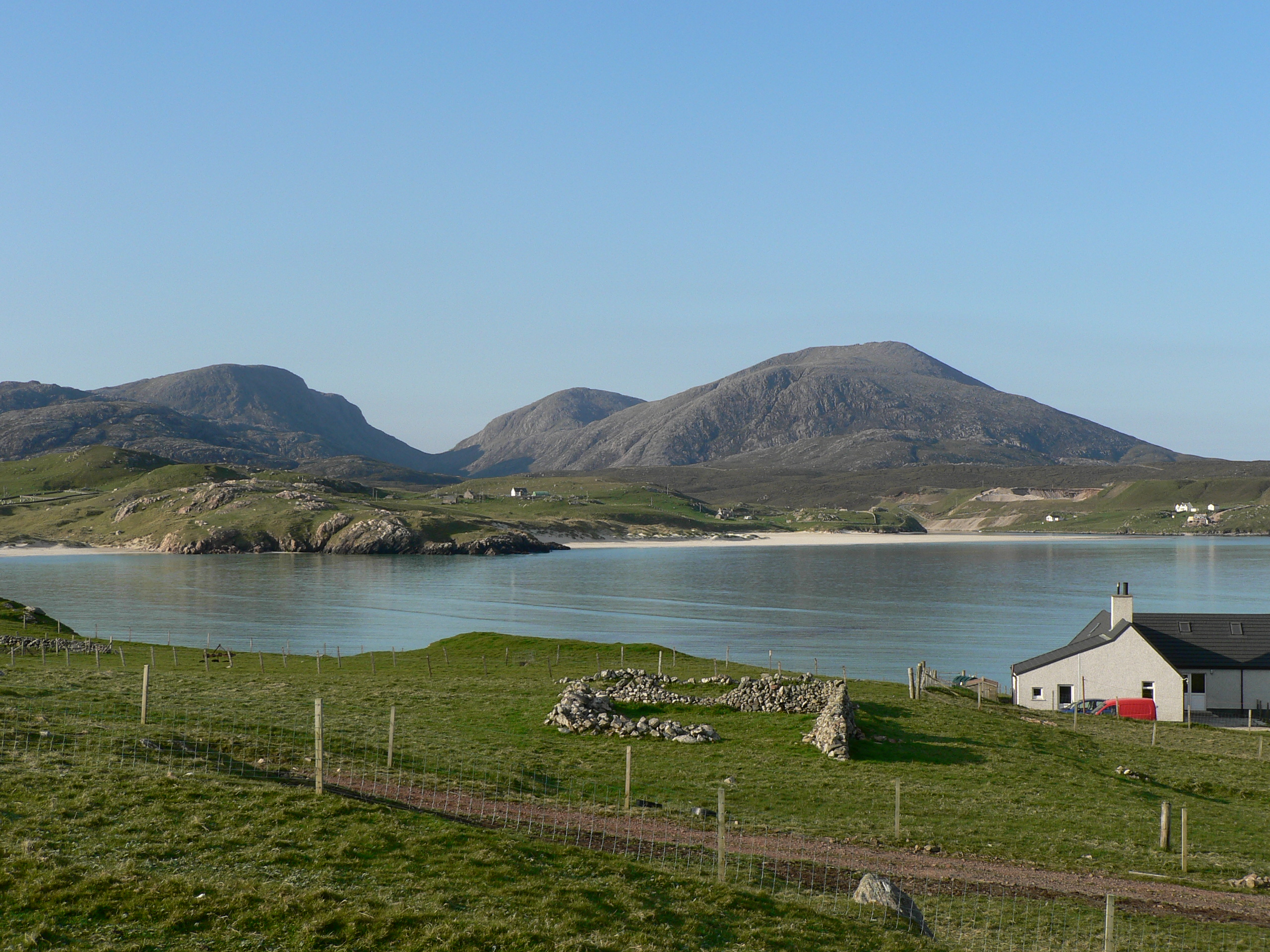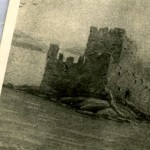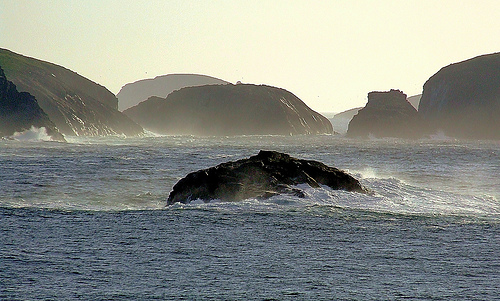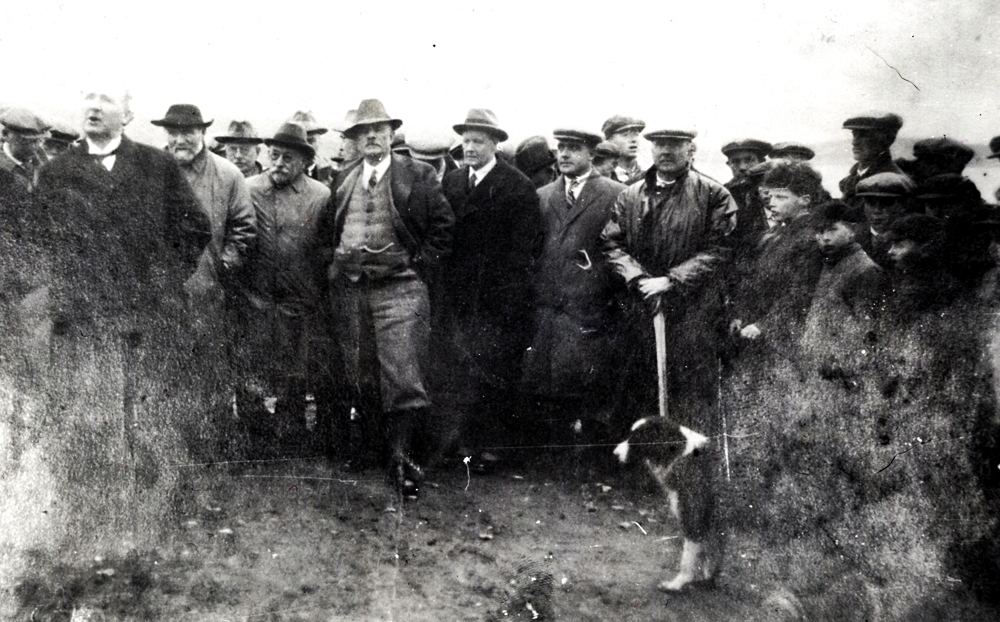Tag: stornoway
A Late Hogmanay
An Iolaire Survivor
no images were found
Translated from an interview with An Geal, John Maclennan, born 1896 at 15 Kneep and married at 4 Aird, Uig. The Admiralty ship the Iolaire taking servicemen home to Lewis grounded on the Beasts of Holm outside Stornoway, on the 1st of January 1919. More than two hundred men perished. Translated by Maggie Smith.
At the end of December 1918, on leave and travelling back to Lewis with other servicemen from Uig, we planned to arrive home on New Year’s day and surprise the families. Approaching Stornoway Harbour on the Iolaire the mistake was made when we changed course. All it required was less than half a point, it just needed to be slightly to the West. The lighthouse was visible, but the man at the wheel didn’t alter the course when he should have.
We never suspected a thing until she hit, it was so quiet and everything was so normal… Only two people escaped from that part of the ship I was in. One brave man swam ashore with a rope and secured it. When the ship grounded she swung round broadside. I remember moving the rope from the stern to the side, but today I don’t quite know how I managed it. A lot of those around me had lost their mind, particularly the younger men. There were no orders from the officers maybe if… If only the ship had grounded closer to the shore, most of those aboard would have been saved. But the rocks we hit were the furthest point from the shore. Although there had been a strong wind it was behind us. I was able to crawl to safety across that rope. The ship sunk eventually and one man was left clinging to the mast until he was rescued. Only seventy five people made it to the shore.
When I got ashore I was shoeless as I had been resting and had taken them off. A lot of the men had taken their shoes off and were lying down, wherever they could get space to rest their head. Reaching the shore I fell into a bog and lost my socks, then I headed for the nearest house, where a huddle of injured people had gathered. I was injured with cuts on my chest, but I never let on to anyone. It was a frosty night and I walked from Holm to Stornoway.
Seeing a sign for the Post Office I headed in that direction. I heard a woman crying. It was Maga (nighean Seonaid Chalum Tharmoid). Maga had met two Uig men who had been on the boat, Uilleam Dubh (William Maclennan 36 Cliff) and (Tuireag) Malcolm Macritchie 7 Aird. They had mentioned I was on the ship, and as they hadn’t seen me since coming ashore, they had come to the conclusion that I too, had been lost.
Scramble for Rural Houses (1949)
“The wanderlust of the Uigeach”, from the Stornoway Gazette, 30 December 1949.
Swedish timber houses allocated to West Uig are not to be built there. Owing to the depopulation of the district there is very little chance of finding tenants. When this news was given to the Lewis District Council by the chairman, Councillor John Maciver, there was a scramble by the other districts in the island to claim the houses. The houses had originally been allocated to West Uig in the hope that they would help to arrest depopulation, but it was not likely that they would ever find tenants for twenty houses in Uig, he said.
Rather than lose the twenty houses, he thought they should try to get them for some other district in rural Lewis. He recognised the congestion around Stornoway, with people coming in to find work in the mills, but he wanted ten of the houses for Shawbost, and he understood Councillor Donald Macleod wanted ten for Point. For the last four houses at Springfield, there were over 100 applications, but only nine of these had come from outside the burgh, although the houses were intended for Point, Back and the central ward of Stornoway.
“Where do you want these houses to go?” he asked.
“I think Councillor Duncan Maciver and I have the first say in that,” said Councillor Smith, Uig. “I think they should be erected near Stornoway, and priority should be given to the people of Uig when they’re finished, as the people of Uig had been chased out of Uig by the County Council and partly by the Lewis District Council. Today we haven’t got the young men and young women left there to occupy them. If they get married they have to go and live on the mainland.”
Councillor Smith went on to say the conditions under which they had to live were a disgrace to humanity, and he made a vigorous attack on the authorities for the neglect of the road.
“It is not my fault. I did my best to get you twenty houses in Uig. It was hoped it would arrest the depopulation, but there’s always a wanderlust in the Uigeach,” said the chairman.
The Long Road to Stornoway (1893)
Mac an t-Srònaich: Not as Bad as All That
Enterprise of Four Uigeachs
Waiting for the Barlow
After Uig: Letter from Rev Macleod to Lady Hood, 1844
A letter from the Rev Alexander Macleod (formerly Established Church minister in Uig, who had taken his congregation to the Free Church in 1843 and left Uig shortly thereafter for Lochalsh) to Lady Hood, his previous patron. See also a letter from 1824.
Lochalsh
19th March 1844
My very dear and much respected friend, I had the pleasure of receiving your friendly letter in Nov. I was sorry to hear that you have been since Easter unwell but happy to learn that you have got better. What ever may have […] in connection with circumstances to make me delay writing you earlier you may rest assured that I always am and ever will be the same to you and yours in principle, affection and respect. Having been called here by the unanimous wish of the congregation of the Free Church of South and East and of Lochalsh in […ing] the [….] in Kintail and Glensheil. I thought it my duty to accept of that call and I was settled as pastor over that congregation on the 4th of Jan last.
My problem […] of life and in connection with other circumstances which I yet expect to state to you face to face. I considered it a kind Providence to be relieved from the labourous and difficult in so many respects as the parish of Uig. There was indeed a probability of my remaining with them did the parishioners on the Uig side of Loch Roag agree to have the Free Church at Breasklete according to the proprietor’s wish and also according to mine. But the population on the Uig side would never agree to this. I for several years back got so sick of that ferry that I felt every wish to have the Free Church on the Callanish or Breasklete side of Loch Roag. There is a site for the new church pointed out on the Uig side by Mr Knox since I left the parish but in a place considered inconvenient for the population & I have not as yet heard whether the people accepted of that place or not. A site would no doubt be more convenient for them at Riff or on some part of the farm that Mr Macaulay claimed but I understand that Mr Knox would not venture to give a site then for fear of more annoyance from Macaulay.
Considering all circumstances I do hope that your mind will be much relieved by selling the Lewes and it is a matter of very great consolation to me that you will have a suitable competency all you life and as I [….] will have also at command what may enlarge your property in any other part of the country where you may choose to buy land.
Macpherson the Wheelwright
Photo by rojabro.
This isn’t strictly an Uig tale, though one episode takes place on the Flannans, and there is a suggestion that Macpherson may be the grandfather of Kenneth Macpherson the catechist from Bayhead, who married Ann Smith from Strome and Valtos and lived in Ness. It’s offered in the hope that someone may be able to shed some light on the story, identify the house of the Misses Crighton, confirm or (more likely) dismiss the connections to the Bayhead family, or identify the source, which is presently unknown. And it’s a good story.
MacPherson was from the East of Scotland, a wheelwright to trade, but he at times followed the sea and took some trips to Greenland as a whale fisher and those trips to the northern seas made him a little money. Mr MacPherson, owing to his trade, was advised by some Lewis gentlemen to come to Stornoway and commence both wheel making and spinning in a factory.
MacPherson decided to come to Lewis but at this time he had previously agreed to go on one more trip to Greenland as harpooner for a season. The ship sailed and the wheelwright/harpooner sailed with her. Some days before they arrived at the fishing ground they noticed a very large whale on the surface, which seemed to be asleep. The captain held a consultation with the ship’s company and said that if they were so successful as to kill that large whale and get her on board they might then return home, for she appeared a big enough whale to make a complete cargo for the ship. But the prudent captain also said that he would leave the decision to the ship’s company. The harpooners, nine in number, unanimously resolved to launch their boat and make a daring effort to kill this monstrously large whale.
They so far succeeded as to strike her with some of their harpoons and as soon as she had dived and they had paid out all their lines, they had to return to their ship with all possible speed. There they awaited impatiently the rising to the surface of the whale. But half an hour passed before she made her appearance and this she did on the very spot where she had disappeared. Her ferocious appearance now made the captain sing out to the crew to cut away all the lines and get clear of her as soon as they could, for her movements were awful and terrible. All hands were now at work, getting the ship clear of this awful monster of the deep, this formidable enemy. But the ship’s crew, with the exception of MacPherson, were to meet their destiny at this spot of water and, to accomplish the melancholy doom, the whale came close to the ship and by one tremendous stroke of its tail, she smashed the ship to pieces and so terrible was the shock that the monster gave to the ship that she sank in a few moments. All the ship’s crew, with the exception of MacPherson, went to a watery grave. MacPherson in his perilous situation, shipped himself on a large piece of the quarter deck and as he found this raft separate from the rest of the wreck, he salvaged some provisions which were floating upon the water. He also obtained a boat’s oar which he used to steer the raft, having lashed himself for safely.
Peigi an Irish and Morgan
Rev Maclennan’s Speech on TB Day
Pic: some of the worthies of Uig and Stornoway at the ceremony.
TB Macaulay, president of the Sun Life Assurance Company of Montreal and descendent of the Macaulays of Uig, visited Lewis in the summer of 1929 to open the new Municipal Buildings in Stornoway (replacing those destroyed in the fire of 1918) and to continue various development projects he had already begun, including the co-operative Macaulay Farm at Arnish. They arrived on 15 June and stayed at Lews Castle as guests of the community, hosted by the Provost Louis Bain and his wife; on their first night a huge bonfire was lit on Goat Island to salute them. They spent three weeks on the island, and on 18 June visited Uig on what became known as an Latha TB – TB Day.
The Gazette reported that sixty motor cars came out from Stornoway to join most of the population of Uig, and parked on the high flats above Valtos – being unable to get down the steep hill to the village. A platform had been erected, with flags and a piper, and an outdoor ceremony took place. TB was greeted by the four oldest men in the village, led by Hector Matheson (97). After a welcome from Murdo Maclean (of Uig and Stornoway), Rev Malcolm Maclennan presented TB with an “illuminated address” and made the following speech.
A Dhaoin’ Uaisil Uig! (Noblemen of Uig. Let me so address you in terms used of old by outsiders, when speaking of your ancestors.) We assemble on this familiar spot to-day to welcome a gentleman only a few ‘Knees’ (as our Gaelic idiom has it) removed from one whose hearth glowed and whose home flourished, attached to this soil – Mr T. B. Macaulay, of Montreal. (Applause.) For the honour of this day’s proceedings we are indebted to the untiring energy and organising genius of our esteemed Chairman [Murdo Maclean] – himself so well known here in his own parish – and who will be long honoured by us for having – shall I not say ? – ‘discovered’ for us our guest, and, not only for introducing him to the Island and to the parish of his forebears and of his Chief, but for having arranged his transport from Montreal so as to make Stornoway his first port of call-a singular thing in ocean travel. (Applause.) If one could dare suggest a possible improvement on what is perfect in this case, it would be to express the wish that it could have been arranged that the ‘Minnedosa’ should have made its first call in Caolas Phabaidh, in sight, if not within hail, of the old hearth of the Macaulay home.




